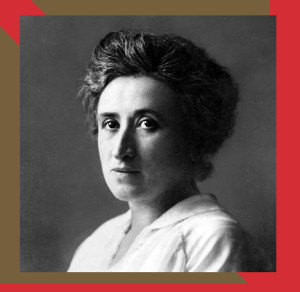During WWI, Germany was having complex political problems on its home front. We don’t often hear much about German women during the war, but Rosa Luxemburg (5th March 1871 – 15th January 1919) was a heroine, standing up and dying for her political views in Germany.
Rosa was born in Poland in 1871 to Jewish parents. From an early age, she knew the world had to change and she wanted to be involved with that. So she studied hard at school and moved to Zurich, Switzerland to go to university there; a place that allowed women to study. Her degree was in philosophy, but she also attended extra curricula lectures in mathematics and zoology. In 1898, she married and moved to Berlin as a German citizen. There she became involved with the German Social Democratic Party, and became a political agitator amongst miners and workers in remote parts of Germany.
Before the First World War began in 1914, there was already unrest brewing in Germany. Rosa was a fierce opponent to war and urged that the working class came together in solidarity to oppose it. At a rally in 1913 she asked if war should be accepted with impunity, and received a resounding “never!” in reply. She was sentenced to one year imprisonment for encouraging disobedience of the law. This was not the first time, nor the last, she was imprisoned. In June 1914, she was again charged with insulting the military for her defence of the thousands of soldiers who were being abused. This was dropped, however, when 30,000 signatures of soldiers who had been abused were collected, and the military was humiliated.
On the 4th of August, 1914, Rosa was devastated. All of the anti-war demonstrations preceding the war were deemed to be a great success, but upon¬†the outbreak of the war the working class went to war without any kind of resistance. This was not the end, though, for the anti-war campaign. Rosa and her friends decided to publish anti-war leaflets, illegally of course. She was later arrested in 1916 and spent a further 2 years in jail. When she was released in 1918, she entered into a different Germany, a Germany that was in a midst of a revolution off the back of the Russian Revolution. Of course she did not remain silent in jail; she continued to write about the war. Although Rosa was in ill health when she left prison, she could not help but to stay heavily involved with the uprisings, and she became the editor of the Red Flag. However, the November Revolution, as it was named, suddenly went sour and the leadership of the left wing was cut down on the 15th of January, 1919, by the guard’s cavalry division (part of the German army stationed in Berlin).
Rosa Luxemburg was murdered and her body thrown into the Landwehr Canal because of her political beliefs that the masses should not be ruled over. In her final editorial piece for the Red Flag she wrote, “The leadership failed. But a new leadership can and must be created by the masses and from the masses. The masses are the crucial factor. They are the rock on which the ultimate victory of the revolution will be built.”
For more information on Rosa, visit the Rosa Luxemburg Foundation; also be sure to check out their virtual exhibition on Rosa’s life.

